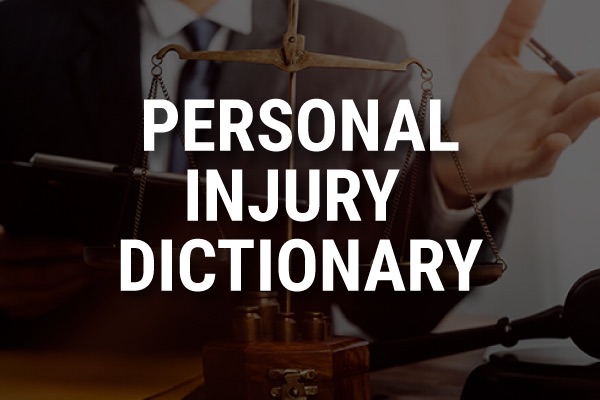
Table of contents
When you are injured in an accident caused by the negligence of another, a personal injury attorney can help you get the compensation you deserve. There are a few terms that you may hear from lawyers and inside the court that you may not be familiar with. To help you feel more comfortable about your case, your trusted Personal Injury Attorneys at the Hernandez Law Group have put together this extensive personal injury dictionary. Here are the terms to know to better understand what is going on with your case:
Affidavit
An affidavit is a written statement that is confirmed by oath or affirmation. It is used as evidence in court.
Answer
Defendants are required by law to submit a formal answer to the complaint of the plaintiff. This officially notifies the plaintiff and the court system of the defendant’s position regarding the allegations made against him/her.
A complaint is the first document filed with a court system by the individual who is claiming legal rights against the other. Whether your case involves a car accident or product liability, every single lawsuit must begin with this step. The complaint needs to fully state the factual and legal basis for the plaintiff’s claim.
Contingency Fee
The dedicated attorneys at the Hernandez Law Group, P.C. have a no-win, no-fee policy, also known as a contingency fee. We don’t take a dime from you if you do not win your case. This is done to ensure that our clients know that they are being taken care of. This also allows individuals to feel free to seek compensation by removing upfront costs.
Damages
Damages are the legal term for what the plaintiff is seeking to recover in their lawsuit. There are two categories of damages:
Economic Damages
This category covers medical expenses, loss of wages, and repairs and replacements for damaged personal property such as a car.
Non-Economic Damages
Non-economic damages cover pain and suffering which can be difficult to assign a sum amount.
Defendant
The party that is being accused of being liable for the plaintiff’s injuries.
Deposition
Depositions are times when witnesses to the accident are asked questions about the event. This gives both sides time to find out what the witness knows and how to best present the witness’s testimony. Depositions help make sure that all facts are clear before going to trial.
Discovery
Discovery is the pre-trial procedure in a lawsuit during which both the defendant and the plaintiff obtain evidence from the other party. This is done to ensure that both have time to get answers from questioning with witnesses, request documents that are being used in the case, and learn about any other evidence which they might not have been aware of. This is to ensure that both parties have a fair chance during the trial.
Negligence

Negligence is the term used to describe the failure to exercise the care or behavior that a reasonable and rational person would exercise in the same circumstances. For example, when building a new pool, a reasonable person would put a fence around the pool to ensure that children living nearby did not wander in by mistake and fall in. Another example is that a reasonable person would ensure that their car was working properly before driving it to avoid an accident.
Injuries that are caused by a person’s failure to provide cautionary care for the protection of themselves and others is the basis for all personal injury cases.
Litigation
Litigation describes the action of bringing a case to court to settle the dispute. This is when both parties appear before a judge or jury to argue their case against each other.
Plaintiff
The party that is bringing the lawsuit against another party or parties.
Personal Insurance Protection
Also known by its abbreviation PIP, this term is used to describe the extension of car insurance that covers medical expenses and lost wages. This is also known as no-fault coverage.
Power of Attorney
The authority to act for another person in specified legal and financial matters.
Prayer for Relief
The prayer for relief is the portion of the complaint in which the plaintiff described the damages or remedies they are seeking from the court.
Statute of Limitations
The statute of limitations is the time limit for bringing legal action against another party. It defines the time that is allowed to pass between the incident and when the lawsuit needs to be filed. This protects parties from being sued long after the accident has occurred.
Tort
A tort is a civil wrong that unfairly causes someone else to suffer loss or harm that results in the legal liability of the individual who committed the act. An example of this would be someone drinking while driving and running a redlight where they T-boned an individual who was driving responsibly.
Do You Need An Experienced Personal Injury Attorney?
While there are many terms unique to personal injury law that can make understanding the ins and outs challenging, you don’t have to face the stress of bringing a claim to court alone. The Hernandez Law Group, P.C. is dedicated to fighting to protect the people of Amarillo, helping them claim the compensation they deserve for damages and medical expenses. We offer free no-obligation consultations so that we can sit down with you to go over your case and decide the best action for you. For more information, contact our experienced attorneys today!
